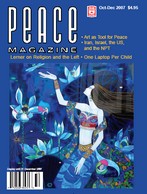
Peace Magazine Oct-Dec 2007, page 28. Some rights reserved.
Search for other articles by Mel Watkins here
By Charles Thorpe (Chicago: University of Chicago Press, 2006, 413p.)
In his ruminations on power and knowledge, the French philosopher Michel Foucault argues that, since World War II, there has been a transition from the "universalist intellectual" able to cast his or her mind broadly and able to command public attention to the "specific intellectual with the specialized and limiting discourse of a discipline." The point of transition for Foucault is the atomic scientist as exemplified by the physicist J. Robert Oppenheimer who spent the war as director of the Manhattan Project that built the first nuclear bombs. With Oppenheimer in his mind, Foucault wrote that the new intellectual is "no longer the rhapsodist of the eternal, but the strategist of life and death."
Though Oppenheimer's life and times have been much studied, Charles Thorpe of University College, London , makes an original contribution to the literature in this "sociological biography." The "scientization" of war has resulted in extraordinary instruments of violence monopolized by the state, while facilitating their use by draining the scientist of the political or moral authority to speak directly to civil society. Oppenheimer, writes Thorpe, "accommodated himself to and internalized the culture and mentality of the national security state." He was thus, as the title of the last chapter of the book puts it "The Last Intellectual." In Foucault's terms, the transition is complete.
In order to become Director of the Manhattan Project, Oppenheimer recanted his progressive views of the'30s and, to get security clearance turned informer, naming names of friends and students who were lefties and suspected communists. He did his best to stop his colleagues on the Manhattan Project from voicing any views against the dropping of the bombs on Japan. Oppenheimer, along with the eminent Danish physicist Niels Bohr, in an act of supreme (ir)rationality, assured their colleagues that the bomb would require the politicians to create the world order which would guarantee peace rather than war. Incredibly, the bomb was turned into an "instrument of peace," perfectly serving its Cold War role.
After the war, ensconced at Princeton, Oppenheimer managed to combine a role as powerful insider in Washington with a public presence, singing the virtues of science as a calling, as an open collegial world that transcended nations and rivalries. He was, to his credit, an arms controller, unsatisfied with containment through nuclear strength. The H-bomb meant a quantum leap in "containment" and Oppenheimer, again to his credit, opposed it, but when President Truman ordered its building he once again "accommodated."
Nevertheless, the H-bomb, the Super as it was then called, was to be his undoing. Opposing it made Oppenheimer an enemy of the military-industrial complex, and particularly of the Air Force which got to fly the planes that dropped the bombs, which led to the charges that denied him his security clearance in the McCarthyite '50s. Accepting it, recon
ciling himself to it, undermined his moral authority and left him a lonely, broken, almost pathetic, figure.
In his final years - he died in 1967 - Oppenheimer became cynical and despairing. He came, writes Thorpe, to see the nuclear dilemma as "intractable" and the world as "basically corrupt and resistant to reform." Having been done in by the state - it was President Eisenhower's refusal to intervene on his behalf that was his final undoing - he nevertheless chose to affiliate himself with the elitist, anti-Communist, CIA-funded Cold War creation, the Congress for Cultural Freedom , with its suspicions of liberal democracy, its fear of totalitarianism not only abroad but at home among the masses as evidenced by McCarthyism. Oppenheimer, who had once cared about the fate of ordinary people sufficiently to contribute his time and money to progressive causes retreated into "respectable" right-wing elitism.
Paradoxically, Oppenheimer's popular image was to become that of the guilt-ridden scientist as humanist, though Oppenheimer in fact never expressed guilt about his role in building the bomb and, on a visit to Japan, refused to go to Hiroshima.
In 1950, in the aftermath of all the horrors of the 40s, from the Holocaust to Hiroshima, the classicist E.A. Havelock published a new translation of Aeschylus's Prometheus Bound with a lengthy preface under the title The Crucifixion of Intellectual Man. His was a bleak view. He meant not only that the intellectual would be crucified if he spoke out against power, but he would be nailed to the cross, and willingly, before he was allowed to serve power in the first place. The Oppenheimer story fits only too well. Six months after his trial in the 50s, a writer compared Oppenheimer's ordeal to a "dry crucifixion." Oppenheimer responded: "You know, it wasn't so very dry. I can still feel the warm blood on my hands."
Reviewed by Melville Watkins, an emeritus professor of political science, University of Toronto.

Peace Magazine Oct-Dec 2007, page 28. Some rights reserved.
Search for other articles by Mel Watkins here